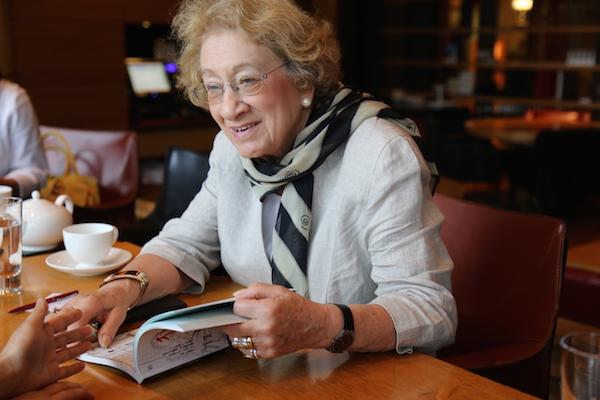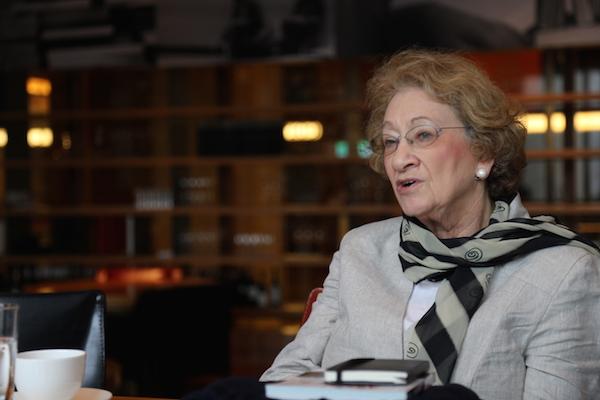Baroness Stern: “What is needed is a time of debate without fear”
Baroness Stern: “What is needed is a time of debate without fear”
Nicholas Plumb|TAEDP Intern
Baroness Vivien Stern, chair of the British All Party Parliamentary Group for the Abolition of the Death Penalty (Footnote 1) , visited Taiwan in May this year, in order to gain a greater understanding of all sides of the death penalty question. She met with NGOs: the Taiwan Alliance to End the Death Penalty (TAEDP); Taiwan Association for Human Rights; Taiwan Association for Innocence; and Covenants Watch. Furthermore, she made a visit to Taipei Detention Centre, met with President Ma and the Minister of Justice Luo Yingxue, met legislators from both of the main parties and discussed matters surrounding the death penalty with academics.
Baroness Stern has spent most of her life working in matters to do with criminal justice, social justice and human rights. She has worked with a number of NGOs, starting domestically and then on a more international level in connection with Penal Reform International (PRI), an organisation which she helped found in 1989.
In 1999 she became a Member of the Upper House of the British Parliament, which provided her with an outstanding opportunity to bring those issues she is so passionate about to the political level. She sat on the Parliamentary Human Rights Committee for 4 years, and was invited by the government to do a study on sexual violence. This looked at how people who report that they have been raped are dealt with by public authorities and was called The Stern Review. Baroness Stern became chair of the Parliamentary Group for the Abolition of the Death Penalty in 2010. This role has allowed her to mobilize fellow parliamentarians on a programme of visiting a number of countries with the death penalty to work with legislators there to help them support abolition. She is vastly experienced in helping to bring about change in many different areas.
Whilst Baroness Stern was positive about the prospects for abolition in Taiwan she warned that this change “is not going to happen overnight, it is a long haul for everybody and you have to be very patient”. She believes that in Taiwan there needs to be a national discussion about “what sort of country this is, what sort of people you are, and what sort of moral standards guide your society” and was clear that this responsibility lay with civil society; the responsibility “to get the death penalty on the agenda outside the framework of the latest horrible murder”.
Her personal view on the death penalty is clear. “I have always been against the death penalty. It just seemed to me from a very young age that it was a completely inappropriate thing to happen in a civilised society. I have never had any reason to question that.” It is therefore clear that for Baroness Stern, the question of abolition is a moral one. Baroness Stern told journalists that framing it in such a way facilitated abolition in the UK, which she explained came about due to a combination of a strong belief in social justice politically, and two cases of wrongful execution. The two together meant that there was the right climate for change.
However, she was also keen to stress that the public were not behind parliament’s decision to abolish the death penalty when they did in 1965. She believes it is a case of: “if members of parliament lead, eventually they will take the public with them”. This is exemplified by a recent 2015 survey, where support for the death penalty in the UK fell below 50% for the first time, to 48% (Footnote 2).
In Taiwan, while there is still significant support for the death penalty (according to the latest figures, around 85%) (Footnote 3), Baroness Stern questioned how deep official polls measuring public opinion go. There is a need for everyone to be more informed, and she believes that NGOs and other members of civil society “need to be able to respond to the anger and trauma that happens when people are affected by acts such as murder, or read about such acts”. The framing of the issue as a moral issue, separate from crimes themselves, is something which she believes needs to be taken up by “well-respected people who look at it in this way, and will say something”.
To return to the experience in the UK, Baroness Stern believes that “the death penalty in the UK is history, especially for young people”. Even at the time of a particularly shocking crime, where there may be calls from victims’ families for a return to the death penalty and media reporting of these statements, this never leads to political action. It is history. She also pointed to the role that prison officers played in the abolition movement in the UK – many were at the forefront of this civic movement and threatened quitting their jobs if conditions didn’t change.
This was an area in Taiwan where Baroness Stern raised concern. “In a developed, civilized, democratic country such as Taiwan, some thought should be given as to what is being asked of a state servant”. She was referring to the role of a prison officer in taking a death row inmate to his death, and the profound psychological impacts this could have. This is not in the job description of an already incredibly difficult job. There needs to be another option in Taiwan. In the UK, the system which replaced the death penalty is one which can be reversed if a defendant is found to be innocent, and one that does not involve the state killing its own citizens. For all cases of murder there is a life sentence, meaning that those found guilty stay in prison until the Parole Board - which consists of a judge, psychiatrist and two other members of civil society - decides they are safe to release.
Baroness Stern believes that there is reason for optimism in Taiwan. “Taiwan is an open, democratic society, there is plenty of literature to read [on the death penalty] and it is freely available. There are checks and balances, political parties and so on: which of course is not the case in many of the countries round the world where there is no debate whatsoever.” What is needed is for this debate to be converted into positive action.
“There is the potential for a civil movement to do the job that has to be done – to engage with the public, and to get people to feel that the death penalty could be abolished, that they would still be safe – that it would have no effect on the levels of crime.” Furthermore, we can take encouragement from the British experience. Public opinion was not in favour of abolition, but through the leadership of moral voices and politicians willing to act, they are now in a situation where “the death penalty is history”. The recent ratification of human rights covenants in Taiwan has given civil society an even greater platform on which to argue the case against the death penalty. Now is the time for those who are morally opposed to state killing to speak out and share these views.
Note: Since this interview, 6 prisoners facing the death sentence were executed. Before these executions, an eight-year-old girl was murdered, and the government struggled with how to deal with public anger. Many saw these executions as a political move by the government to quell public anger. The EU, Amnesty International and the German government issued statements condemning their action.
These executions are also an example of how pressing the need is for action: to get the death penalty on the public agenda outside of the latest horrific murder. Without this separation it will remain very difficult for Taiwan to have a progressive debate about abolition. However, the government must also understand that the death penalty can never be used as a political tool.
EU Statement: http://eeas.europa.eu/statements-eeas/2015/150605_01_en.htm
German Statement:http://newtalk.tw/news/view/2015-06-06/60954
Amnesty International Statement:https://www.amnesty.org/en/latest/news/2015/06/taiwan-six-executed/
Footnote 1:
The UK System of All Party Parliamentary Groups (APPGs) allows members from both the upper and lower house (House of Lords and House of Commons, respectively) to form groups around shared interests and across party lines.
Footnote 2:
http://www.bsa.natcen.ac.uk/media-centre/latest-press-releases/bsa-32-su...
Footnote 3:
Taiwan Alliance to End the Death Penalty (2014), Report on the 2014 International Conference Against the Death Penalty: Life and Death in Taiwan, Page 138: Please refer to this report for a much more detailed discussion of public opinion and the death penalty. TAEDP and Academia Sinica undertook an incredibly detailed public opinion survey, which demonstrated that when the public is presented with alternatives to the death penalty, when they are asked to think about individual cases, and when they are more generally informed, support for the death penalty decreases.





